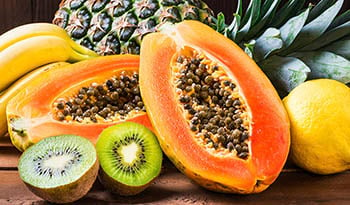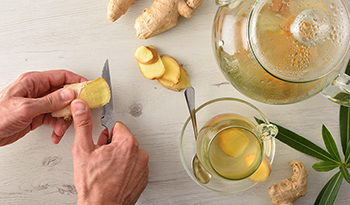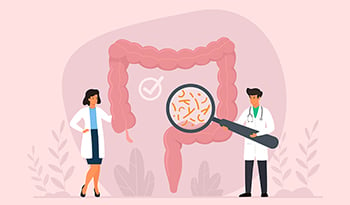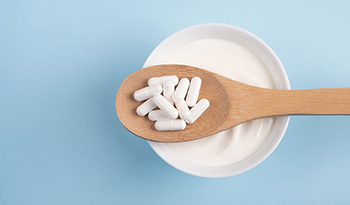Πώς να αποκαταστήσετε το έντερο σας μετά από αντιβιοτικά: 5 συμβουλές ειδικών

Βασικά συμπεράσματα
- Τα αντιβιοτικά σκοτώνουν τόσο τα κακά όσο και τα καλά βακτήρια, τα οποία μπορούν να διαταράξουν το μικροβίωμα του εντέρου σας για μήνες ή και χρόνια.
- Μετά τη χρήση αντιβιοτικών, είναι σημαντικό να επαναπληρωθεί το έντερο με ευεργετικά βακτήρια (προβιοτικά) και να τα ανεφοδιάσετε με τρόφιμα υψηλής περιεκτικότητας σε φυτικές ίνες (πρεβιοτικά).
- Αναζητήστε προβιοτικά συμπληρώματα που περιέχουν καλά μελετημένα στελέχη όπως το Lacticaseibacillus και το Bifidobacterium, τα οποία βοηθούν στην προστασία της επένδυσης του εντέρου και στην απομάκρυνση των κακών βακτηρίων.
- Τροφοδοτήστε τα νέα προβιοτικά σας με τροφές πλούσιες σε πρεβιοτικά όπως σκόρδο, κρεμμύδια, μαύρη σοκολάτα και σπαράγγια.
- Η καθημερινή άσκηση μπορεί επίσης να βοηθήσει στη βελτίωση της ποικιλομορφίας του εντέρου και στην υποστήριξη του ανοσοποιητικού σας συστήματος.
Αντιβιοτικά και υγεία του εντέρου
Με την παγκόσμια χρήση αντιβιοτικών σε υψηλό επίπεδο όλων των εποχών, η υγεία του εντέρου έχει γίνει ένας ολοένα και πιο σημαντικός τομέας εστίασης τόσο για τους παρόχους υγειονομικής περίθαλψης όσο και για τους ερευνητές.
Τα άτομα που λαμβάνουν τακτικά αντιβιοτικά ενδιαφέρονται επίσης να υποστηρίξουν την υγεία του εντέρου, καθώς περισσότερες έρευνες αποκαλύπτουν πώς τα αντιβιοτικά μπορούν να επηρεάσουν το έντερο.
Επειδή τα αντιβιοτικά μπορεί να αλλάξουν δραστικά το περιβάλλον του εντέρου και τη γενική υγεία του εντέρου, η γνώση του τρόπου βελτίωσης της υγείας του εντέρου μετά τη χρήση αντιβιοτικών είναι ζωτικής σημασίας.
Ένα σχέδιο 5 βημάτων για την αποκατάσταση της υγείας του εντέρου μετά από αντιβιοτικά
Η βελτίωση της υγείας του εντέρου μετά τη χρήση αντιβιοτικών μπορεί να είναι θεμελιώδης για τη γενική υγεία. Η έρευνα δείχνει ότι η υγεία του εντέρου συνδέεται περίπλοκα με πολλές άλλες πτυχές ενός υγιούς σώματος, οπότε η ιδιαίτερη προσοχή στην υποστήριξη του εντέρου είναι ζωτικής σημασίας.
Ακολουθούν τρόποι βελτίωσης της υγείας του εντέρου μετά από χρήση αντιβιοτικών:
Βήμα 1: Επαναπληρωθείτε με προβιοτικά
Τα προβιοτικά είναι ένας από τους πιο σημαντικούς τρόπους υποστήριξης του εντέρου μετά τη χρήση αντιβιοτικών. Αυτό συμβαίνει επειδή πολλά προβιοτικά έχουν σχεδιαστεί για να βοηθήσουν στην επαναπλήρωση του εντέρου με ευεργετικά βακτήρια που μπορεί να έχουν αποδεκατιστεί κατά τη λήψη μιας σειράς αντιβιοτικών.
Πολλά προβιοτικά έχουν ευεργετικά στελέχη όπως το Lacticaseibacillus (παλαιότερα ονομαζόμενο Lactobacillus) και το Bifidobacterium. Αυτά τα στελέχη θεωρούνται ευεργετικά επειδή υποστηρίζουν την υγεία του ανθρώπινου εντέρου.
Για παράδειγμα, η έρευνα δείχνει ότι το Lacticaseibacillus μπορεί να βελτιώσει την υγεία του εντέρου αυξάνοντας την παραγωγή βλέννας, προστατεύοντας την επένδυση του εντέρου, παράγοντας αντισώματα όπως η εκκριτική ανοσοσφαιρίνη Α (sIgA) και απελευθερώνοντας αντιμικροβιακά πεπτίδια. Αυτά είναι μικρά μόρια πρωτεΐνης που βοηθούν στην καταπολέμηση μικροοργανισμών που προκαλούν ασθένειες στο έντερο.
Η έρευνα δείχνει επίσης ότι το Bifidobacterium μπορεί να διαδραματίσει σημαντικό ρόλο στη βελτίωση της υγείας του εντέρου. Το Bifidobacterium καταλαμβάνει χώρο και θρεπτικά συστατικά που θα μπορούσαν να έχουν πάει σε παθογόνα είδη. Αυτό καθιστά πιο δύσκολο για τα βακτήρια που προκαλούν ασθένειες να ευδοκιμήσουν στο έντερο.
Επιπλέον, το Bifidobacterium ζυμώνει θρεπτικά συστατικά για να δημιουργήσει οξικό οξύ (η ένωση που βρίσκεται στο ξύδι) και γαλακτικό οξύ, τα οποία βοηθούν στη μείωση της ικανότητας βακτηρίων όπως η Listeria και η Salmonella να μολύνουν το έντερο.
Ενώ ορισμένοι επαγγελματίες υγείας συνιστούν εναλλαγή προβιοτικών κάθε 3 μήνες για την εισαγωγή νέων στελεχών στο έντερο και τον εμπλουτισμό της ποικιλότητας του μικροβιώματος του εντέρου, αυτή τη στιγμή, δεν υπάρχει έρευνα που να υποστηρίζει ή να διαψεύσει αυτήν την πρακτική. Ίσως είναι καλύτερο να παρακολουθείτε τα συμπτώματά σας και να επικοινωνήσετε με τον πάροχο υγειονομικής περίθαλψης για τυχόν αλλαγές ή ανησυχίες.
Ενώ τα προβιοτικά είναι ζωτικής σημασίας για την επαναπλήρωση των ευεργετικών βακτηρίων του εντέρου μετά τη χρήση αντιβιοτικών, αποτελούν μόνο μέρος μιας ολιστικής προσέγγισης. Τα πρεβιοτικά μπορεί επίσης να είναι απαραίτητα για την υποστήριξη της υγείας του εντέρου.
Βήμα 2: Ανεφοδιασμός με πρεβιοτικά
Ενώ τα προβιοτικά δίνονται στο προσκήνιο στη συζήτηση για την υγεία του εντέρου, τα πρεβιοτικά δεν μπορούν να αγνοηθούν. Τα πρεβιοτικά είναι μη εύπεπτες ίνες για τον άνθρωπο. Αυτές οι άπεπτες ίνες περνούν από το ανθρώπινο πεπτικό σύστημα αδιάσπαστα από το στομάχι και το λεπτό έντερο για να χρησιμεύσουν ως τροφή για τα ευεργετικά βακτήρια στο έντερο.
Εάν τα προβιοτικά είναι ο φορέας που προάγει ένα υγιές έντερο, τα πρεβιοτικά θα ήταν το καύσιμο. Τα προβιοτικά δεν μπορούν να ευδοκιμήσουν και να ριζωθούν στο έντερο χωρίς το απαραίτητο καύσιμο για να τα κρατήσουν τροφοδοτημένα.
Πολλοί άνθρωποι παίρνουν προβιοτικά αλλά δεν τους δίνουν το απαραίτητο πρεβιοτικό καύσιμο για να κατοικήσουν και να δημιουργήσουν μια αποικία στο έντερο και δεν λαμβάνουν τα πλήρη οφέλη που μπορεί να προσφέρουν τα προβιοτικά.
Τα πρεβιοτικά όπως η ινουλίνη, η λακτουλόζη και οι φρουκτοολιγοσακχαρίτες, που συνήθως συντομογραφούνται ως FOS, είναι εξαιρετικά χρήσιμες πηγές τροφής για ευεργετικά βακτήρια του εντέρου.
Η έρευνα δείχνει επίσης ότι τα πρεβιοτικά μπορεί να βελτιώσουν την αποτελεσματικότητα των προσλαμβανόμενων προβιοτικών, οπότε η λήψη τόσο ενός προβιοτικού όσο και ενός πρεβιοτικού μπορεί να είναι η καλύτερη προσέγγιση για την υποστήριξη της υγείας του εντέρου.
Ορισμένοι κατασκευαστές συμπληρωμάτων συμπεριλαμβάνουν ακόμη και πρεβιοτικά με τα προβιοτικά τους για να δημιουργήσουν ένα συνβιοτικό συμπλήρωμα.
Βήμα 3: Φορτώστε με πρεβιοτικά και πλούσια σε προβιοτικά τρόφιμα
Δεν χρειάζεται απλώς να βασίζεστε σε συμπληρώματα. Ενσωματώστε τρόφιμα που είναι φυσικά πλούσια σε πρεβιοτικά:
- Σκόρδο
- Κρεμμύδια
- Πράσα
- Σπαράγγια
- Μπανάνες
- Μαύρη Σοκολάτα
Μια τυχαιοποιημένη ελεγχόμενη μελέτη έδειξε ακόμη ότι περίπου 1,1 ουγγιές ή 30 γραμμάρια 85% μαύρης σοκολάτας την ημέρα ασκούν ευεργετικά αποτελέσματα στην υγεία του εντέρου λόγω της πλούσιας περιεκτικότητάς της σε πρεβιοτικά.
Υποστηρίξτε το προβιοτικό σας συμπλήρωμα τρώγοντας τρόφιμα που έχουν υποστεί ζύμωση, τα οποία περιέχουν τα δικά τους διαφορετικά στελέχη ζωντανών βακτηρίων. Οι καλές επιλογές περιλαμβάνουν:
- Γιαούρτι με «ζωντανές και ενεργές καλλιέργειες»
- Κεφίρ
- Ξινολάχανο
- Κίμτσι
- Μίσο
Βήμα 4: Εξετάστε τα μεταβιοτικά
Η έρευνα για τη μεταβιοτική αναδύεται και παράγει ενδιαφέροντα ευρήματα. Ενώ ο ορισμός των μεταβιοτικών εξακολουθεί να βελτιώνεται, συνήθως θεωρούνται ουσίες που απελευθερώνονται ή παράγονται ως αποτέλεσμα των μεταβολικών λειτουργιών ενός μικροοργανισμού που παρέχουν ευεργετικά αποτελέσματα στον ανθρώπινο ξενιστή.
Αυτό σημαίνει ότι κάτι που μπορεί να παράγει ένα βακτηριακό είδος ως αποτέλεσμα της διάσπασης και της πέψης μιας πρεβιοτικής ίνας θα θεωρηθεί μεταβιοτικό. Τα κοινά μεταβιοτικά περιλαμβάνουν λιπαρά οξέα βραχείας αλυσίδας (SCFAs), βιταμίνες όπως Β12 και βιταμίνη Κ, ακόμη και ένζυμα.
Η έρευνα δείχνει ότι τα μεταβιοτικά μπορεί να βελτιώσουν σημαντικά την υγεία του εντέρου. Για παράδειγμα, ένα μεταβιοτικό, το βουτυρικό SCFA, έχει αποδειχθεί ότι βοηθά στην επιδιόρθωση της επένδυσης του εντέρου και στην ενίσχυση του φραγμού του εντέρου μεταξύ των κυττάρων των εντέρων. Η έρευνα δείχνει επίσης ότι το βουτυρικό μπορεί να προστατεύσει τα εντερικά κύτταρα.
Μελέτες in vitro ή μελέτες δοκιμαστικού σωλήνα δείχνουν ότι οι προστατευτικές επιδράσεις του βουτυρικού μπορεί να εξαρτώνται από τη δόση, με χαμηλότερη δόση να παρέχει πιο προστατευτική δράση.
Βήμα 5: Κάντε μέτρια άσκηση
Ενώ η άσκηση είναι απαραίτητη για τη γενική υγεία, μπορεί επίσης να συμβάλει σε ένα υγιές έντερο μετά τη χρήση αντιβιοτικών. Μια βιβλιογραφική ανασκόπηση διαπίστωσε ότι η μέτρια άσκηση τόσο με αερόβια όσο και με προπόνηση δύναμης ή αντίστασης οδήγησε σε ένα υγιέστερο ανοσοποιητικό σύστημα και μεγαλύτερη ποικιλία του μικροβιώματος του εντέρου.
Η μελέτη διαπίστωσε επίσης ότι η άσκηση βοήθησε στη βελτίωση της ακεραιότητας του φραγμού του εντέρου και στη βελτίωση της απορρόφησης θρεπτικών συστατικών.
Η σημασία της υγείας του εντέρου
Η σημασία της υγείας του εντέρου δεν μπορεί να υπερεκτιμηθεί. Οι ερευνητές πιστεύουν ότι το ανθρώπινο έντερο μπορεί να περιέχει πάνω από 1.000 διαφορετικά είδη βακτηρίων καθώς και διάφορους μικροοργανισμούς. Αυτό είναι συλλογικά γνωστό ως μικροβίωμα του εντέρου.
Το μικροβίωμα του εντέρου είναι ένα θέμα που είναι εξίσου συναρπαστικό και όλο και πιο δημοφιλές. Καθώς η έρευνα συνεχίζει να αποκαλύπτει πόσο αναπόσπαστο είναι το μικροβίωμα του εντέρου, πολλά έγκυρα και σεβαστά ιδρύματα υγείας και πάροχοι υγειονομικής περίθαλψης παρέχουν ενημερωτικό και εκπαιδευτικό περιεχόμενο σχετικά με την υποστήριξη της υγείας του εντέρου.
Έρευνες δείχνουν ότι ένα υγιές μικροβίωμα του εντέρου είναι σημαντικό για την πέψη, το μεταβολισμό, την ανοσολογική λειτουργία και ακόμη και την ψυχική υγεία. Για παράδειγμα, μια μελέτη κοόρτας ανέλυσε δείγματα κοπράνων 198 ατόμων και διαπίστωσε ότι εκείνοι που ανέφεραν άγχος είχαν χαμηλότερο πληθυσμό διαφορετικών βακτηριακών ειδών στο μικροβίωμα του εντέρου τους.
Η ίδια μελέτη διαπίστωσε ότι άτομα με υψηλότερα επίπεδα πρωτεοβακτηρίων ανέφεραν επίσης ότι είχαν καταθλιπτικά συμπτώματα. Τα πρωτεοβακτήρια είναι μια μεγάλη ομάδα βακτηρίων που περιλαμβάνουν παθογόνα ή παθογόνα στελέχη όπως το Escherichia coli (E. coli) και η σαλμονέλα.
Οι ερευνητές πιστεύουν ότι το μικροβίωμα του εντέρου μπορεί να έχει τόσο βαθιές επιπτώσεις στην ανθρώπινη υγεία λόγω του άξονα μικροβίας-έντερου-εγκεφάλου. Ο άξονας μικροβίας-έντερος-εγκεφάλου είναι η περίπλοκη αλληλεπίδραση μεταξύ του εντέρου, του εγκεφάλου και των τρισεκατομμυρίων μικροοργανισμών που ζουν στο έντερο.
Ένας υγιής άξονας μικροβίας-έντερου-εγκεφάλου βοηθά στη ρύθμιση του ανοσοποιητικού συστήματος, στη μείωση της φλεγμονής, στην υποστήριξη της κίνησης των τροφίμων μέσω του πεπτικού συστήματος για βελτιωμένη κινητικότητα του εντέρου και ακόμη και στην υποστήριξη της ορμονικής υγείας.
Το να έχετε ένα υγιές έντερο με ποικίλα και ευεργετικά βακτήρια είναι υψίστης σημασίας. Με την αυξημένη χρήση αντιβιοτικών, αυτή η πλούσια ποικιλία που είναι τόσο σημαντική για την υγεία του εντέρου μπορεί να τεθεί σε κίνδυνο.
Πώς τα αντιβιοτικά μπορούν να επηρεάσουν την υγεία του εντέρου
Πριν από την εμφάνιση των αντιβιοτικών, μια απλή πληγή ή τραυματισμός θα μπορούσε να σημαίνει θάνατο. Αλλά με τις ιατρικές ανακαλύψεις των αντιβιοτικών ήρθε μια πιο λεπτή κατάσταση. Η παγκόσμια υπερβολική χρήση αντιβιοτικών σε οτιδήποτε, από ανθρώπους έως ζώα, έχει συμβάλει στην αντοχή στα αντιβιοτικά, αλλά αυτή δεν είναι ολόκληρη η ιστορία.
Έρευνες δείχνουν ότι η χρήση αντιβιοτικών μπορεί να μεταβάλει σημαντικά την υγεία του εντέρου. Πολλαπλές διαχρονικές μελέτες παρατήρησης έχουν δείξει πώς οι σειρές αντιβιοτικών όπως η αμοξικιλλίνη και η σιπροφλοξασίνη έχουν συμβάλει στην αλλοίωση των μικροβιωμάτων του εντέρου έως και 3 μήνες μετά τη διακοπή της χρήσης αντιβιοτικών.
Ορισμένες έρευνες δείχνουν ότι οι αλλαγές στο μικροβίωμα του εντέρου μπορεί να παραμείνουν ακόμη περισσότερο.
Για παράδειγμα, μια διαχρονική μελέτη παρατήρησης ακολούθησε τέσσερα άτομα που είχαν λάβει μια σειρά 7 ημερών με το αντιβιοτικό κλινδαμυκίνη και τέσσερα άτομα ελέγχου για δύο χρόνια.
Δείγματα κοπράνων και από τις δύο ομάδες συλλέχθηκαν σε εννέα διαφορετικές χρονικές στιγμές καθ 'όλη τη διάρκεια της μελέτης. Τα ευρήματα της μελέτης ήταν εκπληκτικά. Οι ερευνητές διαπίστωσαν ότι η ομάδα που έλαβε αντιβιοτικά είχε χαμηλότερο επίπεδο βακτηριδίων, ένα είδος βακτηρίων που προσφέρει οφέλη στον άνθρωπο βοηθώντας στη διάσπαση των υδατανθράκων για την παραγωγή ενέργειας.
Αυτό που είναι ακόμα πιο συγκλονιστικό είναι ότι τα άτομα που έλαβαν το αντιβιοτικό δεν ανέκτησαν ποτέ την αρχική σύνθεση του πληθυσμού των Bacteroides κατά τη διάρκεια της διετούς μελέτης.
Αυτή η έρευνα δεν υποδηλώνει ότι τα αντιβιοτικά είναι επιβλαβή ή περιττά. Υπογραμμίζει τις πολύ πραγματικές επιπτώσεις που μπορεί να έχουν τα αντιβιοτικά στην υγεία του εντέρου.
Δεδομένου ότι τα αντιβιοτικά σκοτώνουν όλα τα βακτήρια αδιάκριτα, δυστυχώς καταστρέφονται και τα καλά βακτήρια. Αυτό υποδηλώνει ότι η χρήση αντιβιοτικών μπορεί να προκαλέσει σημαντικές επιπτώσεις στη γενική υγεία, όπως δυσλειτουργία του ανοσοποιητικού συστήματος, μεταβολικές αλλαγές και αυξημένη φλεγμονή.
Συμπέρασμα
Ενώ η χρήση αντιβιοτικών μπορεί να είναι αναπόφευκτη και επιθυμητή σε ορισμένες λοιμώξεις, υπάρχει έρευνα που υποδηλώνει ότι μπορεί να αλλάξει σημαντικά το μικροβίωμα του εντέρου. Ως εκ τούτου, είναι απαραίτητο να βοηθήσετε στην υποστήριξη και τη βελτίωση του μικροβιώματος του εντέρου μετά τη χρήση αντιβιοτικών.
Με την ενσωμάτωση προβιοτικών, πρεβιοτικών, μεταβιοτικών και τακτικής άσκησης στη ρουτίνα σας, μπορεί να είστε σε θέση να υποστηρίξετε ένα υγιές έντερο μετά από αντιβιοτικά και έναν γενικά πιο υγιεινό τρόπο ζωής.
Αναφορές:
- Μπράντλεϊ, Π.Χ., Πόλαρντ, Κ.Σ. Τα πρωτεοβακτήρια εξηγούν σημαντική λειτουργική μεταβλητότητα στο μικροβίωμα του ανθρώπινου εντέρου. Μικροβίωμα 5, 36 (2017). https://doi.org/10.1186/s40168-017-0244-z
- Κράιαν Τζον Φ., Ο' Ριόρνταν Κ. Τζ., Κάουαν CSM, κ.α. Ο άξονας μικροβίας-έντερου-εγκεφάλου. Physiol Rev. 2019; 99 (4): 1877-2013. doi: 10.1152/physrev.00018.2018
- του Βος WM, Τιλγκ Χ, Βαν Χουλ Μ, Κάνι Π.Δ. Μικροβίωμα και υγεία του εντέρου: μηχανιστικές γνώσεις. Αύγουστος 2022; 71 (5) :1020-1032. δεύτερο:10.1136/gutjnl-2021-326789
- Ντέμπσεϊ Ε, Κορρ Σ.Κ. Lactobacillus spp. για την γαστρεντερική υγεία: Τρέχουσες και μελλοντικές προοπτικές. Μπροστινή ανοσολογία 2022; 13:840245. Δημοσιεύθηκε 2022 6 Απρ. doi:10.3389/fimu.2022.840245
- Huang X, Li Z, Zhu L, Huang H, Hou L, Lin J. Η αναστολή της πρωτεϊνικής κινάσης ενεργοποιημένης με μιτογόνο p38 εξασθενεί την εξασθένηση του εντερικού φραγμού που προκαλείται από βουτυρικό σε μοντέλο μονοστιβάδας κυττάρων Caco-2. J Παιδατρ Γαστρεντερολ Νουτρ 2014; 59:264-9
- Τζέρμπεργκ, Κ., Λόφμαρκ, Σ., Έντλουντ, Κ., & Γιάνσον, Τζέι Κ. (2007). Μακροπρόθεσμες οικολογικές επιπτώσεις της χορήγησης αντιβιοτικών στην ανθρώπινη εντερική μικροχλωρίδα. Εφημερίδα ISME, 1 (1), 56—66. 10.1038/Ιούλιος 2007.3
- Κλάιν ΕΥ, Ιμπάλλι Ι, Πολέον Σ, κ.α. Παγκόσμιες τάσεις στην κατανάλωση αντιβιοτικών κατά τη διάρκεια του 2016-2023 και μελλοντικές προβλέψεις έως το 2030. Διαδικασία Εθνικής Ακαδημίας Επιστημών 2024; 121 (49) :e2411919121. δεύη:10.1073/pnas.2411919121
- Λες Ντετλέφσεν, Σ. Χ., Σόγκιν, Μ.Λ. και Ρέλμαν, Ντ.Α. (2008). Οι διάχυτες επιδράσεις ενός αντιβιοτικού στη μικροχλωρίδα του ανθρώπινου εντέρου, όπως αποκαλύπτεται από βαθιά αλληλουχία 16S rRNA. Βιολογία PLoS, 6 (11), e280. 10.1371/journal.pbio.0060280
- Λιου Χ, Γουάνγκ Τζ, Χε Τ, και συν. Βουτυρικό: Ένα δίκοπο σπαθί για την υγεία; Δεκέμβριος 2018; 9 (1) :21-29. δύο: 10.1093/προηγήσεις/nmx009
- Μαλάν-Μίλερ Σ, Βαλές-Κολόμερ Μ, Παλόμο Τ, Λέζα Τζι. Ο άξονας εντέρος-μικροβίας-εγκεφάλου σε έναν ισπανικό πληθυσμό μετά την πανδημία COVID-19: σύνθεση μικροβίων που συνδέεται με προφίλ άγχους, τραύματος και κατάθλιψης. Μικρόβια του εντέρου. 2023; 15 (1) :2162306. doi: 10.1080/19490976.2022.2162306
- Μάρτινιακ Α, Μεντίνσκα-Πρζέτσεκ Α, Βέντριχοβιτς Α, Σκοτσέν Σ, Τομάσικ ΠΓ. Πρεβιοτικά, Προβιοτικά, Συνβιοτικά, Παραπροβιοτικά και Μεταβιοτικές Ενώσεις στην IBD. Βιομόρια. 2021; 11 (12) :1903. Δημοσιεύθηκε το 2021 18 Δεκεμβρίου. doi:10.3390/βιο11121903
- Matera M. Bifidobacteria, Lactobacilli... πότε, πώς και γιατί να τα χρησιμοποιήσετε. 2024. https://www.sciencedirect.com/science/article/pii/S2667009724000071
- Γραφείο Συμπληρωμάτων Διατροφής (ODS), Εθνικά Ινστιτούτα Υγείας. Προβιοτικά. Ενημερωτικό δελτίο επαγγελματιών υγείας. Ενημερώθηκε στις 25 Μαρτίου 2025. https://ods.od.nih.gov/factsheets/Probiotics-HealthProfessional/
- Patangia DV, Anthony Ryan C, Dempsey E, Paul Ross R, Stanton C. Επιπτώσεις των αντιβιοτικών στο ανθρώπινο μικροβίωμα και συνέπειες για την υγεία του ξενιστή. Μικροβιολογίαανοιχτό. 2022; 11 (1): e1260. doi: 10.1002/mbo3.1260
- Roy S, Dhaneshwar S. Ο ρόλος των πρεβιοτικών, των προβιοτικών και των συνβιοτικών στη διαχείριση της φλεγμονώδους νόσου του εντέρου: Τρέχουσες προοπτικές. Παγκόσμια Γαστρεντερολίνη. 2023; 29 (14): 2078-2100. doi: 10.3748/wjg.v29.i14.2078
- Σιν Τζι, Κιμ Κ.Σ., Τσα Τζ, και συν. Η κατανάλωση 85% μαύρης σοκολάτας κακάου βελτιώνει τη διάθεση σε συνδυασμό με τις μικροβιακές αλλαγές του εντέρου σε υγιείς ενήλικες: μια τυχαιοποιημένη ελεγχόμενη δοκιμή. Τζέι Νουτρ Βιοχημεία. 2022; 99:108854. δύο: 10.1016/j.jnutbio.2021.108854
- Varghese S, Rao S, Khattak A, Zamir F, Chaari A. Φυσική άσκηση και το μικροβίωμα του εντέρου: Μια αμφίδρομη σχέση που επηρεάζει την υγεία και την απόδοση. Θρεπτικά συστατικά. 2024; 16 (21): 3663. Δημοσιεύθηκε το 2024 28 οκτ. doi:10.3390/nu16213663
- Γουέξλερ ΧΜ. Βακτηριοειδή: το καλό, το κακό και το ασήμαντο. Κλινική Μικροβιόλη Αναθ. 2007; 20 (4): 593-621. doi: 10.1128/CMR.00008-07
- Ζλάτκοβιτς, Ν., Άλεξιτς, Γ., & Γκάσιτς, Κ. (2005). «Ανθεκτικότητα της κυρίαρχης ανθρώπινης μικροχλωρίδας κοπράνων σε σύντομη πρόκληση αντιβιοτικών». Εφημερίδα της Κλινικής Μικροβιολογίας, 43 (11), 5588—5592. 10.1128/JCM.43.11.5588
- Żółkiewicz J, Marzec A, Ruszczyński M, Feleszko W. Μεταβιοτικά - Ένα βήμα πέρα από τα προβιοτικά και τα προβιοτικά. Θρεπτικά συστατικά. 2020; 12 (8) :2189. Δημοσιεύθηκε το 2020 στις 23 Ιουλίου. doi:10.3390/nu12082189
ΑΠΟΠΟΙΗΣΗ ΕΥΘΥΝΗΣ:Αυτό το Κέντρο Ευεξίας δεν προορίζεται να παρέχει διάγνωση...
















































































 Πίνακας περιεχομένων
Πίνακας περιεχομένων














